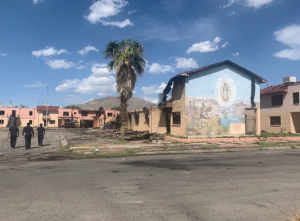
By Tom Schuba and Rosemary Sobol
Detectives are scrutinizing Brandon Sanders’ background, which includes an arrest in Montana for allegedly forcing his wife into sex work, as they investigate one of the murders.
In a vain attempt to locate his brother, Rasim Katanic visited gymnasiums filled with bodies during the Bosnian War.
Her father, who kept hoping she would return, kept in touch with 18-year-old Iman Al-Sarraj, who also had immigrant roots.
Murder has now linked their lives.
A Chicago police investigation is looking into whether Brandon Sanders, who was previously arrested in Montana and accused of forcing his wife into prostitution, is responsible for their deaths.
After a chance encounter on the local residential roofing of a West Ridge restaurant in May, Sanders has been charged with stabbing Katanic to death. Al-Sarraj, whose beaten body was discovered early this month in Sanders’ West Ridge apartment, has not been charged with murder.
Based on Sanders’ history in Montana, detectives will likely investigate similar missing persons cases, police say.
It’s just been a devastating loss that we’re still processing as a family,” Katanic’s daughter, Aida Sutardio, said.
The father of the girl said he had never given up hope of seeing her again. “They didn’t give her a chance,” Khalil Sarraj said. “Nobody has the right to do that.”
Violence is on the rise
Detectives discovered Sanders’ arrest at a Motel 6 in Great Falls, Montana, on Aug. 14, 2019. An employee reported seeing him sit in the parking lot while his wife “entertained multiple male guests” in a room.
Sanders’ wife, who came to the U.S. from Germany to attend college, told investigators she was “very naive” when she met Sanders, who encouraged her to become a sex worker and used “extreme violence” against her.
According to records, Sanders was charged with human trafficking and aggravated prostitution promotion. After he and people close to him allegedly intimidated and harassed his wife, who was in protective custody, he and others were charged with witness tampering. His wife eventually returned home to Germany.
According to court records, she began dating Sanders in 2018, while attending college in Chicago, and “he persuaded her to try prostitution as a way for them to make easy money.”
Records show Sanders choked her in front of a hotel mirror to force her to stay in prostitution. She told investigators Sanders got her hooked on cocaine, which she used “to get through client meetings.”
According to court records, Sanders’ trial was delayed because his wife refused to travel to the United States due to COVID-19. After he was released on his own recognizance, the judge dropped the case after refusing to allow her to testify virtually.
She said in an email to a prosecutor: “Besides the pandemic, I’m also not ready to face all of these things in a courtroom. I also don’t want to see Brandon.”
Sanders faced around 25 years in prison but would likely have received a lighter sentence of roughly 10 years if convicted, according to prosecutor Joshua Racki.
“I wish we had been able to get him,” Racki said. “But with the judge’s ruling, that’s where we were.”
Earlier in 2016, Sanders had pleaded guilty to choking an ex-girlfriend from behind in her car and sending her threatening text messages, according to court records.
An arrest report states that Sanders was kicked out of the Electric Hotel Nightclub at 222 W. Ontario St. early on Jan. 1 this year “due to being irate.”.
According to the report, Sanders shoved the manager as a manager escorted him out of the club. He was charged with misdemeanor assault and battery.
He was pissed off as anyone could be, the manager said. “I was scared s—less of him.”
Later that month, Sanders’ first court hearing resulted in the charges being dropped.
Erratic behavior
According to prosecutors, Sanders took a fateful stroll through West Ridge’s “Little India” area on May 12.
As he was trying to open an account at Hanmi Bank, 6335 N. Western Ave., he began acting erratically. After calling the FBI’s National Threat Operations Center and reporting a plot to overthrow the government, an employee called the police.
The prosecutor alleges he walked through a back room to a courtyard at a shoe store near Devon and Western avenues before the cops showed up. Around 4 p.m., surveillance footage shows Katanic lingering in the courtyard before climbing a stairwell to the residential roof, where he worked on a cooler compressor nearby.
Katanic was later found dead from stab wounds.
Two recent Loyola University Chicago graduates reported a burglary at their Devon and Western apartment the following day. Katanic’s screwdriver had been used to unscrew the skylight, after which Sanders shaved in the bathroom, changed his clothes, and left behind a smattering of evidence, prosecutors said.
Sanders’ Timberland boots were placed in the oven, and a water jug containing Sanders’ DNA was found on the stove, prosecutors said. The screwdriver and hair trimmer were found atop a mailbox in front of the building.
He walked to a furniture store in the 2700 block of West Devon Avenue where he previously worked shortly before 6 p.m., prosecutors said. He was wearing some of Katanic’s stolen clothing and had Katanic’s keys hanging from his waistband.
After Sanders was seen acting erratically by his uncle, who called the store owner for help, Sanders told him he no longer had to pay rent because his landlord was on the roof.
As he approached Evanston, he flagged down a police officer and asked to be taken to the hospital, prosecutors said.
At his bail hearing, Sanders’ attorney stated “there are some issues with a mental state.” He remains in jail without bond. Sanders has been charged with murder, robbery, and burglary.
Police found Al-Sarraj’s body the same day he appeared in court.
It was a tragic life
Katanic’s daughter, Aida Sutardio, has a hard time understanding “that he was slaughtered on a roof.”
She asked, “Do we ever process this? Do we ever figure out how to move forward from this?”
Katanic lived a full life, but Sutardio said it was defined by tragedy.
After his brother went missing, Sutardio travelled to gymnasiums where remains from mass graves were brought, hoping to locate his brother’s body or belongings during the Bosnian War.
It never happened to him.
My dad’s daughter said, “I think that really broke him down.” That’s how he ended up in America.
Because his wife worked nights, Katanic was the primary caretaker of his two daughters. He pushed them to get educated, work hard, and stay close to their family.
After retiring at 66, he continued working for longtime clients, including Tahoora Sweets & Bakery, 2345 W. Devon Ave., where he was killed.
We never thought that his life would end this way,” Sutardio said. “Living in Chicago, you hear about violence, you read about it. You never think that you will be a part of that statistic.”
Sutardio learned from a family member who lives nearby that Al-Sarraj’s body was found in Sanders’ apartment.
Sanders was free at the time, so she asked why.
“I think that just reflects how inconsistent our system is and how many holes there are,” Sutardio said. “Every step of the way, his crimes grew and grew until he ended up killing two people.”
It was a heartbreaking call
Earlier this month, police called Khalil Sarraj while he was driving a taxi in downtown Chicago.
After asking why they needed to meet, Sarraj suddenly realized what the meeting was about. “Oh my God, I started crying. Is she okay? Is she alive? Is she dead?” he asked.
He was told that his daughter had been murdered by the officer.
As a result of Sarraj’s move to the United States from Israel, Al-Sarraj was born in Chicago to a Yugoslavian mother.
He said, “My heart is shattered in a million pieces. I will never, ever be able to lead a normal life again.”.
Visiting Al-Sarraj’s grave every day, he prays for her soul.
Al-Sarraj’s short, turbulent life was described in detail by Sarraj and his wife, Arnetia Seals.
Despite her mother taking her out of school in the third or fourth grade, Sarraj and his wife were able to enroll her as a freshman at Schurz High School in Irving Park.
In order to acclimate to a more normal life, she joined the Reserve Officer Training Corps.
Sarraj said, “She lost so many years, but she was doing well.”
A year after attempting to “put all the pieces together,” Al-Sarraj fled.
At one point, her mom contacted Sarraj and asked him if she wanted to move back with him, but Al-Sarraj insisted her mom was lying and that she was happy where she was.
In August, Sarraj texted his daughter because his brother was in town from Israel.
She replied, “I don’t want to see anyone.”.
Her father’s last communication with her was that one.





